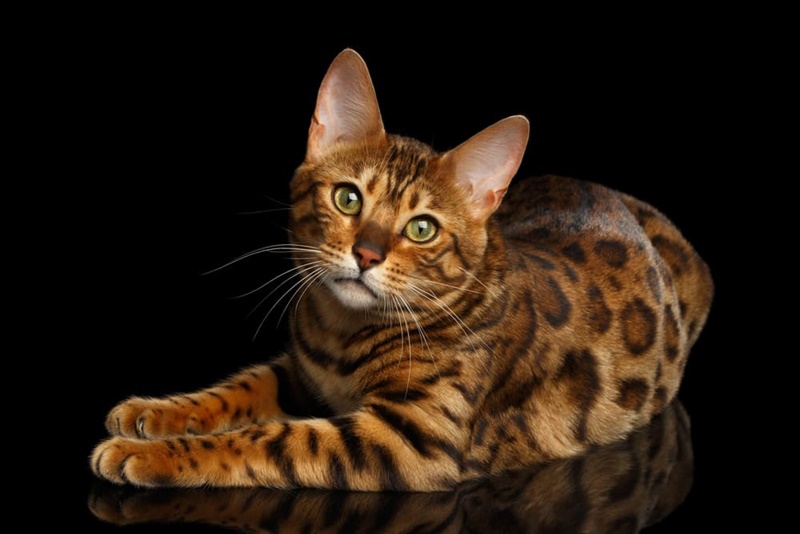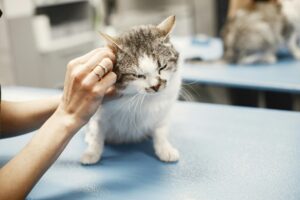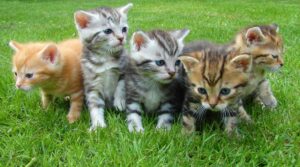From their unique personality quirks to their surprising origins and specific care requirements, being prepared for a Cheetoh cat can make the difference between a challenging experience and a rewarding companionship.
Let’s dive into everything you need about these fascinating felines to help you decide if a Cheetoh cat is the right addition to your family.
Cheetoh Cat Quick Facts
| Price | Typically, it ranges from $800 to $2,000, depending on the breeder and quality. |
| Personality and Temperament | Friendly, outgoing, and highly intelligent. Cheetohs are known for being affectionate and loyal. |
| Activity Level | High energy; they love climbing, playing, and exploring. |
| Grooming Needs | Low maintenance; their short coat requires occasional brushing (weekly) to manage shedding. |
| Health Considerations | Generally healthy but should be monitored for common feline issues like dental problems and obesity. |
| Lifespan | 12–15 years with proper care. |
| Size and Physical Appearance | Large and muscular, weighing 15–23 pounds. Spotted or marbled coat resembling a wild cat, with a sleek and exotic look. |
| Allergy Concerns | It is not hypoallergenic and may trigger reactions in allergy sufferers. |
| Compatibility with Children and Other Pets | Excellent with children and adaptable to households with other pets, provided proper introductions. |
| Vocalization Levels | Moderate; they communicate but are not overly talkative. |
| Adaptability to Environment | Thrives in active households and adapts well to apartments and houses, provided they have room to roam and play. |
| Insurance Cost | The average monthly pet insurance cost is $30–$50 due to their size and exotic lineage. |
Cheetoh Cat Price
Cheetoh cats in the USA typically range from $800 to $2,000 for kittens, depending on lineage, age, and gender. Some breeders may charge higher prices for show-quality cats or those with champion bloodlines. Retired adult Cheetohs may be available at lower prices.
Breed Origin
The Cheetoh cat breed was first developed in 2003 by Carol Drymon of Wind Haven Exotics cattery. Her goal was to create a domestic cat with the appearance of a spotted wild cat but a gentle and friendly temperament.
Breed Development
Drymon created the Cheetoh by crossing Bengal cats with Ocicats. The breeding program aimed to develop a cat that:
- Resembled a wild cat
- They had an extraordinary wild look
- Possessed an extraordinarily docile and gentle nature
Recognition
The breed has gained some recognition in the cat breeding world:
- United Feline Organization recognized the Cheetoh in November 2004
- The International Cat Association (TICA) lists it as an “experimental breed.”
- Currently not recognized by the Cat Fanciers Association
Breeders throughout the United States were invited to participate in establishing the breed, and now there are registered breeders in Australia, New Zealand, and Canada.
Unique Traits
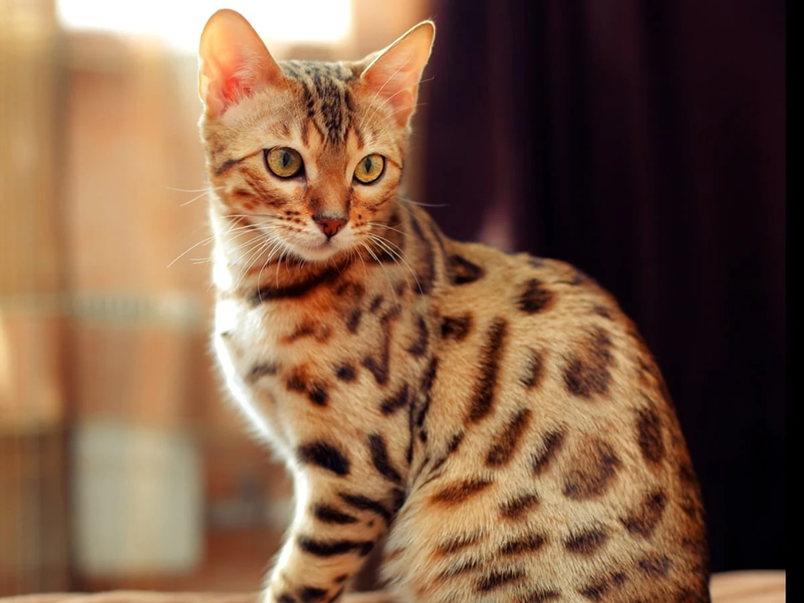
Cheetoh cats possess several unique traits that set them apart from other breeds, combining physical and personality traits.
Physical Traits
- Wild Appearance: Cheetohs have a striking resemblance to wild cats, particularly cheetahs. They feature a short, smooth coat often spotted or rosette, mirroring the coat patterns of their wild counterparts. Variations can include marbled patterns as well.
- Size and Build: This breed is notably large, with males weighing 15 to 25 pounds and females slightly smaller. Their muscular build and athletic figure contribute to their wild look and a characteristic low-shouldered walk inherited from the Ocicat.
- Distinctive Features: Cheetoh cats have a broad muzzle, strong jaws, and slightly chiselled heads with prominent ears. These features enhance their exotic.
Personality and Temperament
Cheetoh cats are known for their vibrant personality and engaging temperament, making them a popular choice for families and individuals.
Personality Traits
- Affectionate and Social: Cheetohs are incredibly loving, often seeking human companionship. They enjoy being around people and are known to be lap cats, relishing cuddles and attention from their owners.
- Energetic and Playful: This breed is highly energetic and playful, requiring plenty of stimulation.
Cheetohs love to engage in activities like running, climbing, and playing fetch. Their playful nature can sometimes lead them to wake their owners early for playtime.
- Intelligent and Curious: Cheetoh cats are competent and quick learners. They can be trained to perform tricks and even walk on a leash. Their curiosity drives them to explore their environment, making interactive toys and climbing structures essential for their well-being.
Temperament
- Gentle and Friendly: Cheetohs are gentle and friendly despite their wild appearance. They typically get along well with other pets, including dogs and cats, especially if they are energetic companions. Their sociable nature means they thrive in households where they have company.
- Vocal and Communicative: Cheetohs are known for being vocal and expressing themselves through various sounds. This trait adds to their charm but can also lead to some noise at home.
- Sensitive to Loneliness: These cats do not like being alone for long periods. They may become distressed or bored if they are not given enough attention or companionship. Adopting more than one Cheetoh or providing them with other pets for social interaction is often recommended.
Overall, the Cheetoh cat’s combination of affection, energy, intelligence, and sociability makes them an excellent choice for families looking for an engaging pet.
Care and Grooming
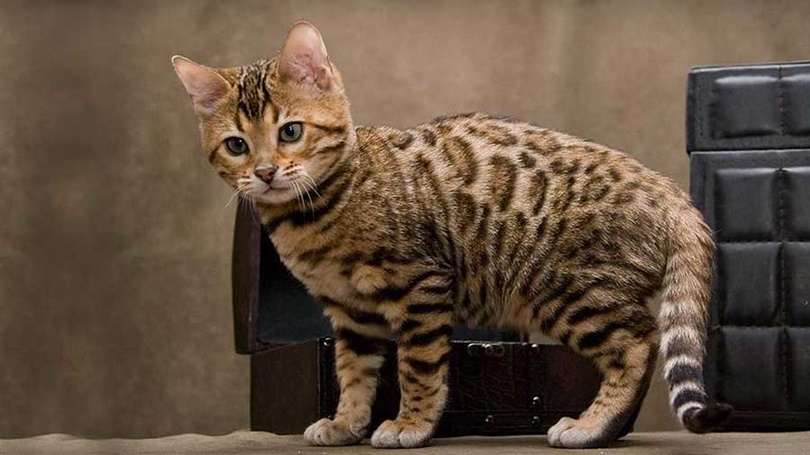
Cheetoh cats have relatively low-maintenance grooming needs but require consistent care to keep them healthy and happy.
Grooming Requirements
- Brushing: Weekly brushing is recommended to keep their short, sleek coat healthy and minimize shedding. Their coat is short and doesn’t require extensive grooming, making them relatively easy to maintain.
- Nail Care: Regular nail trimming is essential, as Cheetohs love to climb and can potentially damage furniture with long nails. They generally tolerate nail trimming well, especially if started when they are young.
Additional Care Considerations
- Dental Hygiene: Regular teeth brushing is recommended to prevent dental disease
- Diet: High-protein, high-quality cat food is crucial, with portion control to prevent weight gain
- Training: They are highly trainable and can learn tricks and even walk on a leash
Cheetoh cats are relatively low-maintenance but require consistent engagement and care to keep them healthy and happy.
Health and Lifespan
Cheetoh cats, like many hybrid breeds, can be prone to specific health issues. While the breed is relatively new and specific, health data is limited; we can infer potential health concerns based on their parent breeds, the Bengal and Ocicat.
Cardiovascular Concerns
Hypertrophic Cardiomyopathy (HCM): This is the most common type of heart disease in cats, characterized by the thickening of the heart muscle. Cheetohs may inherit this condition from their Bengal ancestry.
Musculoskeletal Problems
- Luxating Patella: This condition involves the dislocation of the kneecap, which can cause mobility issues.
- Hip Dysplasia: Cheetohs may be prone to hip problems due to their large size.
Eye Conditions
Progressive Retinal Atrophy (PRA): This inherited condition causes gradual retina deterioration, potentially leading to blindness.
Other Potential Issues
- Dental Disease: Cheetohs can be prone to dental problems like gingivitis and periodontitis, like many cat breeds.
- Polycystic Kidney Disease (PKD): While not explicitly mentioned for Cheetohs, this is a concern in some cat breeds and may be worth monitoring.
Genetic Screening
To mitigate these health risks, responsible breeders should conduct genetic screenings for:
- PK Deficiency (PK-Def): A condition that can cause anemia.
- Bengal Progressive Retinal Atrophy (PRA).
- Hypertrophic Cardiomyopathy (HCM).
Preventive Care
Regular veterinary check-ups, a balanced diet, and proper dental care can help maintain a Cheetoh cat’s health. Owners should be vigilant for signs of these conditions and seek veterinary care promptly if any symptoms arise.
Lifespan
While the search results do not provide specific information about Cheetoh cats, we can draw insights from similar hybrid cat breeds. Based on the information about Bengal and hybrid cats, a Cheetoh cat’s average lifespan is likely around 12 to 16 years.
Factors Influencing Lifespan
Several key factors can impact a Cheetoh cat’s life expectancy:
- Indoor vs. Outdoor Living: Indoor cats typically live longer, with an average lifespan of 12-20 years, compared to outdoor cats who may only live 5-10 years.
- Genetics: The cat’s breed and genetic background play a significant role in determining longevity.
- Health Care: Regular veterinary check-ups, proper nutrition, and preventive care can help extend a cat’s life.
Is Cheetoh Cats Right for You?
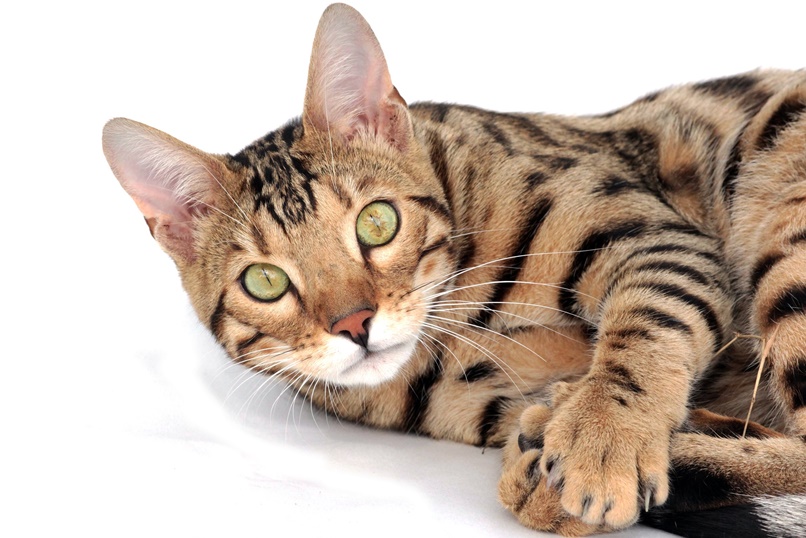
Deciding whether a Cheetoh cat is the right pet for you involves considering several aspects of their personality, care needs, and lifestyle compatibility. Here are key factors to help you determine if a Cheetoh cat fits your home:
Lifestyle Compatibility
- Active Households: Cheetoh cats do best in homes with plenty of physical activity and mental stimulation. They are not suited for owners who frequently away from home or prefer a low-energy pet.
- Social Environment: These cats thrive on companionship and may become distressed if left alone for long periods. They will likely adapt well if you have other pets or family members who can interact with them.
Cheetoh Cats vs Similar Breeds
Cheetoh cats share similarities with other hybrid breeds, particularly Bengals and Ocicats, but they have distinct characteristics that set them apart.
Appearance
- Size: Cheetohs are generally larger than Bengals and Ocicats, with males weighing up to 23 pounds.
- Coat: Like Bengals, Cheetohs have spotted or rosetted coats that resemble wild cats. However, Cheetohs may have more prominent spots and a few stripes.
- Features: Cheetohs have slightly more chiselled faces and more prominent ears than Bengals.
Personality
- Affection: Cheetohs are affectionate and sociable, often more so than Bengals. They tend to be lap cats and form strong bonds with their families.
- Energy Levels: Both Cheetohs and Bengals are highly energetic and playful.
- Sociability: Cheetohs are generally more outgoing and friendly with strangers than Bengals, who may be more reserved.
Care Requirements
- Exercise: Like Bengals, Cheetohs need ample opportunities for physical activity and mental stimulation.
- Grooming: Cheetohs have low-shedding coats, making them relatively easy to groom compared to some other breeds.
Temperament
- Vocalization: Both Cheetohs and Bengals tend to be vocal cats.
- Intelligence: Cheetohs and Bengals are both known for their high intelligence and ability to learn quickly.
While Cheetohs share many traits with Bengals and Ocicats, they tend to be larger, more affectionate, and more sociable than their parent breeds. Their unique combination of wild looks and gentle temperament makes them stand out among hybrid cat breeds.
Frequently Asked Questions About Cheetoh Cats
What factors influence the price of Cheetoh cats?
The price of a Cheetoh cat typically ranges from $800 to $2,000, influenced by several factors. These include the cat’s pedigree, coat pattern quality, breeder reputation, geographical location, and whether the cat is meant for showing or companionship. Show-quality Cheetohs with exceptional patterns and confirmed genetic health testing generally command higher prices.
How does the price of Cheetoh cats compare to other hybrid breeds?
Cheetoh cats are generally priced similarly to hybrid breeds like Bengals and Savannahs. While they may be more expensive than traditional domestic breeds, they’re often more affordable than F1 or F2 Savannah cats, which cost upwards of $10,000. Their pricing reflects their unique breeding program and relatively rare status in the cat fancy world.
What specific vaccinations are recommended for Cheetoh cats?
Cheetoh cats require the standard core vaccinations, including:
- FVRCP (Feline Viral Rhinotracheitis, Calicivirus, and Panleukopenia)
- Rabies
- FeLV (Feline Leukemia Virus) recommended for outdoor access cats
Consult your veterinarian for a personalized vaccination schedule based on your cat’s lifestyle and risk factors.
Are Cheetoh cats suitable for families with small children?
Cheetoh cats typically make excellent family pets, including homes with children. Their playful nature and patient temperament make them good companions for kids.
However, supervision is essential during interactions, and children should be taught proper handling techniques. These cats are known for their tolerance and gentle disposition when adequately socialized.
How do Cheetoh cats handle being alone for extended periods?
While more independent than some breeds, Cheetoh cats form strong bonds with their families and prefer not to be left alone for extended periods. They can typically manage 8-10 hours alone but thrive with companionship.
Consider getting a second pet if you’re frequently away from home. They may show signs of anxiety or destructive behaviour if left alone for too long.
What kind of exercise does a Cheetoh cat need to stay healthy?
Cheetoh cats are energetic and require significant daily exercise. Plan for:
- 30-45 minutes of interactive play daily
- Access to climbing spaces and scratching posts
- Puzzle toys for mental stimulation
- Regular opportunities for running and jumping
Are Cheetoh cats suitable for apartment living?
Cheetoh cats can adapt to apartment living if their exercise and enrichment needs are met. They benefit from:
- Vertical space with cat trees and wall perches
- Window access for bird-watching
- Interactive play sessions
- Dedicated play areas However, they thrive best in larger spaces where they can fully express their athletic abilities.
How much protein should be in a Cheetoh cat’s diet?
Cheetoh cats require a high-protein diet, with at least 35-40% protein content in their food. Their active nature and muscular build demand quality protein sources. Look for foods with meat as the first ingredient, and avoid those with excessive fillers or grains.
What are the benefits of raw meat for Cheetoh cats?
Raw meat diets can offer several benefits for Cheetoh cats, including:
- Better protein absorption
- Improved dental health
- Enhanced hydration
- More natural nutrition However, consult with your veterinarian before starting a raw diet, as it requires careful planning and proper food handling to be safe and nutritionally complete.
What are the challenges faced by Cheetoh breeders today?
Current Cheetoh breeders face several challenges:
- Maintaining genetic diversity in a relatively new breed
- Meeting increasing demand while ensuring quality
- Educating potential owners about proper care
- Managing breeding costs while keeping prices reasonable
- Ensuring adequate health testing and documentation

